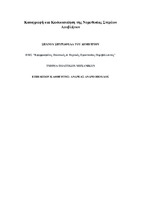| dc.contributor.advisor | Ανδρεόπουλος, Ανδρέας | |
| dc.contributor.author | Σπανού, Σπυριδούλα | |
| dc.date.accessioned | 2022-12-01T09:46:43Z | |
| dc.date.available | 2022-12-01T09:46:43Z | |
| dc.date.issued | 2022-11-22 | |
| dc.identifier.uri | https://polynoe.lib.uniwa.gr/xmlui/handle/11400/3427 | |
| dc.identifier.uri | http://dx.doi.org/10.26265/polynoe-3267 | |
| dc.description.abstract | Η Ελλάδα είναι πλήρες μέλος της Ευρωπαϊκής Ένωσης από το 1981. Η χώρα παράγει σήμερα περίπου 4,5 εκατομμύρια τόνους αστικών και εμπορικών απορριμμάτων ετησίως, που ισοδυναμεί με ένα κατά κεφαλήν ρυθμό παραγωγής απορριμμάτων
μεταξύ 400/500 κιλών. Από τη συνολική ποσότητα Αστικών Στερεών Αποβλήτων (ΑΣΑ) που παρήχθη το 2010, το 80% τέθηκε σε ΧΥΤΑ σε αντίθεση με τις προσδοκίες των οδηγιών της ΕΕ για την υγειονομική ταφή. Από αυτή την άποψη, η Ελλάδα ήταν από τις λίγες χώρες της ΕΕ που δεν είχαν στόχο να εκτρέψουν το 75% των επιπέδων βιοαποδομήσιμων απορριμμάτων του 1995 από τους χώρους υγειονομικής ταφής. Έκτοτε, η χώρα συνέχισε να αγωνίζεται για την επίτευξη των ελάχιστων στόχων της Οδηγίας για τους ΧΥΤΑ. Η παρούσα εργασία εξετάζει κριτικά τη νομοθεσία και τη συμμόρφωση των ΑΣΑ στην Ελλάδα, από το πλαίσιο της
Οδηγίας της ΕΕ για τους ΧΥΤΑ (1999/31/ΕΚ). Το έγγραφο προτείνει δραστικές ενέργειες για τη μείωση της ποσότητας των απορριμμάτων που αποστέλλονται στους ΧΥΤΑ στην Ελλάδα, εάν ο στόχος της Οδηγίας της ΕΕ (1999/31/ΕΚ) για το 2020
ήταν 35%. Το έγγραφο συνιστά επίσης την ενθάρρυνση της μεγαλύτερης συμμετοχής των πολιτών στην ανακύκλωση για την επίτευξη του στόχου ανακύκλωσης 50% που έχει τεθεί από την αναθεωρημένη οδηγία πλαίσιο για τα απόβλητα (2008/98/ΕΚ) | el |
| dc.format.extent | 90 | el |
| dc.language.iso | el | el |
| dc.publisher | Πανεπιστήμιο Δυτικής Αττικής | el |
| dc.publisher | Ευρωπαϊκό Πανεπιστήμιο Κύπρου | el |
| dc.rights | Αναφορά Δημιουργού - Μη Εμπορική Χρήση - Παρόμοια Διανομή 4.0 Διεθνές | * |
| dc.rights | Attribution-NonCommercial-NoDerivatives 4.0 Διεθνές | * |
| dc.rights.uri | http://creativecommons.org/licenses/by-nc-nd/4.0/ | * |
| dc.subject | Αστικά στερεά απόβλητα | el |
| dc.subject | Στερεά απόβλητα | el |
| dc.subject | Νομικό πλαίσιο | el |
| dc.subject | Διαχείριση στερεών αποβλήτων | el |
| dc.subject | Θεσμικό πλαίσιο | el |
| dc.subject | ΧΥΤΑ | el |
| dc.title | Καταγραφή και κωδικοποίηση της νομοθεσίας στερεών αποβλήτων | el |
| dc.title.alternative | Comprehension and codification of the solid waste law | el |
| dc.type | Μεταπτυχιακή διπλωματική εργασία | el |
| dc.contributor.committee | Βαρελίδης, Γεώργιος | |
| dc.contributor.committee | Alexakis, Dimitrios | |
| dc.contributor.faculty | Σχολή Μηχανικών | el |
| dc.contributor.department | Τμήμα Πολιτικών Μηχανικών | el |
| dc.contributor.master | Εφαρμοσμένες Πολιτικές και Τεχνικές Προστασίας Περιβάλλοντος | el |
| dc.description.abstracttranslated | Greece has been a full member of the European Union since 1981. The country currently produces about 4.5 million tons of municipal and commercial waste per year, which is equivalent to a per capita waste production rate of between 400/500 kg. Of the total amount of Municipal Solid Waste (MSW) generated in 2010, 80% was landfilled contrary to the expectations of the EU landfill directives. In this respect, Greece was one of the few EU countries that did not aim to divert 75% of 1995 biodegradable waste levels from landfills. Since then, the country has continued to strive to achieve the minimum objectives of the Landfill Directive. This paper critically examines the legislation and compliance of MSW in Greece, from the framework of the EU Landfill Directive (1999/31 / EC). The document proposes drastic measures to reduce the amount of waste sent to landfills in Greece, if the target
of the EU Directive (1999/31 / EC) for 2020 was 35%. The document also recommends encouraging greater citizen participation in recycling to achieve the 50% recycling target set by the revised Waste Framework Directive (2008/98 / EC). | el |


